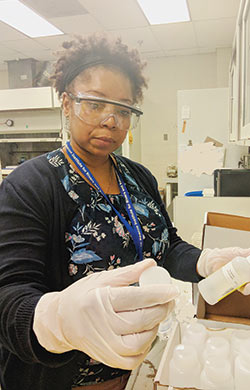The Environmental Engineer and “Physics Drifter”, Tracy Williams
Fall
2019
Spotlight on Hidden Physicists
The Environmental Engineer and “Physics Drifter”, Tracy Williams
Environmental Regulatory Compliance Engineer at GlobalFoundries
 I like to think of myself as a physics drifter, letting this wonderful degree take me from one mission and objective in my career to the next. I’m currently an environmental regulatory compliance engineer, but I doubt my journey will stop here. My career path has never been steady or straightforward, and believe it or not, that aspect has been great.
I like to think of myself as a physics drifter, letting this wonderful degree take me from one mission and objective in my career to the next. I’m currently an environmental regulatory compliance engineer, but I doubt my journey will stop here. My career path has never been steady or straightforward, and believe it or not, that aspect has been great.
At an early age, I found myself very excited by machines with speed: jet planes, race cars, space shuttles, you name it. I didn’t know exactly what I wanted to do—I just knew I wanted to go fast, “shake ‘n bake” like Ricky Bobby. In high school I started to realize that some of my ambitions to “just go fast” wouldn’t pan out. When I landed in a great high school physics class, I began to learn the why and how behind going fast, and my love for the science of the physical grew, propelling me into everything science.
Still, I had no interest in pursuing a physics degree in college. No way was I going to be stuck in a lab coat, fiddling around in a makeshift lab, sporting bad hair while searching for plutonium to power my DeLorean. After trying to major in mechanical engineering, electrical engineering, and even English literature, I finally learned that there was life beyond academia and research with a physics degree—options like medicine, law, and architecture. I was sold, ultimately obtaining my degree in physics and an MS in materials science. During this time I was able to work with the Department of Energy on several projects, including fuel cell work, vapor deposition for nanoscale technologies, and analytical microscopy.
This sort of quirky educational background landed me in IBM’s Microelectronics Division, where I worked as a semiconductor process engineer. Given my background in physics and materials science, I became one of the outlier thinkers in most of the engineering groups I worked with. I could adapt to almost any role because my somewhat complex educational background came down to something fairly simple—I’m a critical thinker who solves problems. I then successfully transitioned to an industrial engineering role, then an environmental operations engineering role, and now I’m an environmental regulatory compliance engineer with GlobalFoundries.
In this role, I’ve been able to use my physics research skills to implement changes in hazardous and nonhazardous waste operations, ensuring little to no harm comes to our environment through the process of microchip manufacturing. Implementing innovative ideas that help to both satisfy the microchip process and maintain a healthy environment is tough at times, but necessary.
On that same pattern of thought—making innovative creations that are environmentally friendly—I recently started a small business to create and build environmentally safe products for everyday life. This is the newest part of my physics drift, and one that I’m looking forward to making great contributions toward.
If I had known, at the beginning of my collegiate career, all the places a degree in physics could and would take me, I would have never doubted pursuing this degree. I’m still not certain where I’ll end up in my career and have never really had a definitive outlook on the end—but that’s what makes this journey all the more exciting.
